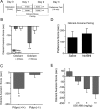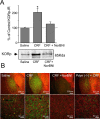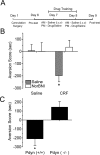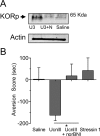The dysphoric component of stress is encoded by activation of the dynorphin kappa-opioid system
- PMID: 18184783
- PMCID: PMC2612708
- DOI: 10.1523/JNEUROSCI.4458-07.2008
The dysphoric component of stress is encoded by activation of the dynorphin kappa-opioid system
Abstract
Stress is a complex human experience having both positive and negative motivational properties. When chronic and uncontrollable, the adverse effects of stress on human health are considerable and yet poorly understood. Here, we report that the dysphoric properties of chronic stress are encoded by the endogenous opioid peptide dynorphin acting on specific stress-related neuronal circuits. Using different forms of stress presumed to evoke dysphoria in mice, we found that repeated forced swim and inescapable footshock both produced aversive behaviors that were blocked by a kappa-opioid receptor (KOR) antagonist and absent in mice lacking dynorphin. Injection of corticotropin-releasing factor (CRF) or urocortin III, key mediators of the stress response, produced place aversion that was also blocked by dynorphin gene deletion or KOR antagonism. CRF-induced place aversion was blocked by the CRF2 receptor antagonist antisauvigine-30, but not by the CRF1 receptor antagonist antalarmin. In contrast, place aversion induced by the KOR agonist U50,488 was not blocked by antisauvigine-30. These results suggest that the aversive effects of stress were mediated by CRF2 receptor stimulation of dynorphin release and subsequent KOR activation. Using a phospho-selective antibody directed against the activated KOR to image sites of dynorphin action in the brain, we found that stress and CRF each caused dynorphin-dependent KOR activation in the basolateral amygdala, nucleus accumbens, dorsal raphe, and hippocampus. The convergence of stress-induced aversive inputs on the dynorphin system was unexpected, implicates dynorphin as a key mediator of dysphoria, and emphasizes kappa-receptor antagonists as promising therapeutics.
Figures






References
-
- Bale TL, Vale WW. CRF and CRF receptors: role in stress responsivity and other behaviors. Annu Rev Pharmacol Toxicol. 2004;44:525–557. - PubMed
-
- Beardsley PM, Howard JL, Shelton KL, Carroll FI. Differential effects of the novel kappa opioid receptor antagonist, JDTic, on reinstatement of cocaine-seeking induced by footshock stressors vs cocaine primes and its antidepressant-like effects in rats. Psychopharmacology (Berl) 2005;183:118–126. - PubMed
-
- Cador M, Ahmed SH, Koob GF, Le Moal M, Stinus L. Corticotropin-releasing factor induces a place aversion independent of its neuroendocrine role. Brain Res. 1992;597:304–309. - PubMed
Publication types
MeSH terms
Substances
Grants and funding
LinkOut - more resources
Full Text Sources
Other Literature Sources
Molecular Biology Databases
